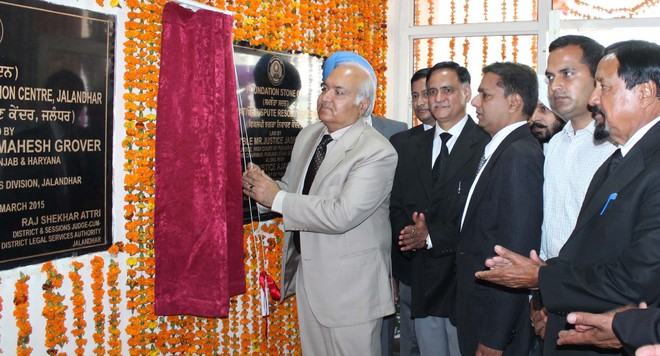ADR Centre inaugurated
Nikhil Bhardwaj
Tribune News Service
Jalandhar, March 24
The alternative dispute resolution (ADR) centre was inaugurated in Jalandhar courts by the Punjab and Haryana High Court judge-cum- chairman of the Mediation Committee of the High Court Justice Mahesh Grover today.
Justice Grover, who was also Administrative Judge, Jalandhar, was here for two days for the inspection of the District Courts. Earlier the services, including mediation, conciliation and arbitration, offered by the ADR, which is being run by the District Legal Services Authority (DLSA), were available on the court premises only and litigants visiting court rooms often faced problems in locating the particular offices.
Tajinder Bir Singh, Additional District and Sessions Judge-cum Additional Member Secretary, Punjab Legal Services Authority, while talking to The Tribune, said, “Now all services being offered by the DLSA would be offered under one roof, including the services of permanent lok adalat, mediation, arbitration, free legal aid etc. The front office has been set up in the ADR, where litigants would be made aware of facilities and free legal aid.” Singh said a toll-free number “1968” was also operational where any person could call and get guidance about the free legal services, adding that the DLSA had also been publishing the services by putting up posters in public places and holding seminars.
Justice Grover was accompanied by District and Sessions Judge RS Attri, Munish Singhal, Member Secretary Punjab Legal Services Authority, Rana Kanwar Deep Kaur, Secretary DLSA, DC KK Yadav and other judicial and police officials.
Victim Compensation Scheme
Additional Member Secretary Tajinder Bir Singh said to provide speedy disposal of funds to victims or their dependents under the Victim Compensation Scheme under Section 357-A of the CrPC, serious efforts were being made by legal services authority. Asked if funds flow from the government was regular, Singh said earlier there was problem of funds but after the authority approached the finance department of the government on the issue, it assured the authority to release the funds at routine intervals. About the time limit in releasing funds, Singh said they were trying to release funds on a day-to-day basis. “The government releases funds to the head office which later transfer funds to the DLSA and then the same funds are being transferred to the victims or their dependents,” Singh added. The scheme offers ex gratia from Rs 40,000 to Rs 4 lakh to crime victims under Section 357-A of the CrPC. A victim of a serious crime can approach the DLSA and can apply for compensation. The compensation will be awarded to the victims or their dependents either on the recommendation of the court or on the application given by such victims or their dependents to the DLSA formed in each district of the state. Sources said for rape victim, Rs 4 lakh compensation will be given to the dependents in a rape with murder, while Rs 3 lakh for rape, Rs 1 lakh for loss of life.
Matrimonial disputes
In a move that may help in arriving at a speedy compromise between disputing couples, the Punjab Legal Services Authority has insisted upon the police to hand over the matrimonial dispute cases for mediation at the alternative dispute resolution (ADR) centre.
The purpose behind the move is to achieve speedy as well as unbiased compromise between the disputing couples. Earlier the ADR was taking up only those cases in which litigation was on, but now with the fresh notification and amendment, the ADR can also take up cases at the pre-litigative stage in which litigation is yet to start.
Tajinder Bir Singh, Additional Member Secretary, Punjab Legal Services Authority, said it was mandatory for the police to transfer matrimonial dispute cases to the ADR. Singh said it was entirely at the discretion of the disputing parties if they wanted mediation thorough retired judges or from well-trained mediators at the mediation centre. Sources said the move came after the alleged reports of biased decisions by the mediation centre at women police stations.
Unlock Exclusive Insights with The Tribune Premium
Take your experience further with Premium access.
Thought-provoking Opinions, Expert Analysis, In-depth Insights and other Member Only Benefits
Already a Member? Sign In Now










